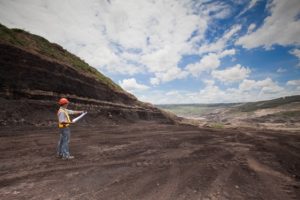
Engineering Geologists work as advisors to private and public bodies on the natural, environmental and geological threat in real estate development. They will assess whether ground rock is stable enough and whether it is a safe type of rock on which to build.
What Does an Engineering Geologist Do?
They are effectively a bridge between geology, engineering and public health. The geology training helps engineers understand environmental threats. The engineering element helps geologists understand the unique challenges of civic works and private development. Finally, both are encouraged to understand the need to consider public health and safety during civic works.
Engineering Geologists will look at safety issues such as rock stability for a site and ask such questions as: can the underlying bedrock support heavy structures? Is the bedrock stable enough to support mass development such as transit systems and tall buildings? Is the rock radioactive? Is the radiation level considered safe for people to live and work here? What are the geological risks of building here? They will also look at human developments that might affect the stability of the ground - mine shafts, waste disposal sites (gas leaks as well as ground stability).
They do not just look at the ground rock, but also water sources, soil stability and other natural processes that could impact a new development. This way, they are more like environmental engineers when they study such issues as flood risk. They will assess commercial and industrial development, public works, assessment of military activity (such as ground assessments in areas that have been bombed - many work in Iraq, ensuring that a site is safe before redevelopment).
Where Does an Engineering Geologist Work?
Overwhelmingly, they will work in civil engineering and civic works. Hazard assessment is a large part of their job so they can often expect to work for government bodies assessing the potential for developments. Public health and environmental health are now legal obligations in assessing a site for development, not just for wildlife and environmental impact, but for human health. We need to understand whether an area is prone to flooding, earthquakes or other ground instability.
Also for government or even in the private sector, they may assess and examine sites following a disaster - though not just the large ones. A river flood may lead to soil and / or geology instability once the waters have fallen back. They could be involved in making the ground safe again. This is a role they could carry out in the charitable sector too.
In the private sector, they will perform much the same work. However, they could also be involved shoring up a site after a site closes down. Some private bodies that have dug through soil or geological features may be obliged to ensure its safety - typically old mine shafts on privately-owned land. They may consult or employ Engineering Geologists to ensure that this work is carried out properly.
What Is the Average Engineering Geologist Salary?
As of May 2020, engineering geologists, who fall under the broader BLS category of mining and geological engineers, earned a median salary of $93,800. The lowest 10% earned around $57,040, and the highest 10% earned more than $156,270 during this time.*
Engineering Geology Jobs & Job Description
Engineering geologists specialize in the interdisciplinary study of geology as well as the fundamentals of engineering. The field requires a deep understanding about the soil, rock, groundwater and other natural systems. This career can include or require the following skills:
- Apply geology principles to engineering and structural concerns
- Draft plans to build, develop, excavate, protect and utilize the environment
- Collect and classify rock, soil and groundwater samples in particular areas under study
- Laboratory analysis of field samples collected
- Assessment of groundwater activity and hydrogeological properties for excavations or well installations
- Develop accurate geological logs, mappings, records, and drawings of all information collected
- Possess exemplary written, oral and technical skills
- Undergo geological investigations of various properties and projects
- Knowledge of relevant laws and regulations regarding environmental investigations and areas of study
- Knowledge of hazardous waste disposal and identification
- Extensive travel to various locations may be required; work may be in a localized or remote area
- Develop action plans, conclusions and remediation plans about the land area based on information collected through field sampling
- Excellent ability to problem solve and communicate with clients
- A senior level position as an engineering geologist includes managing and overseeing a team of individuals, as well as components of an entry-level engineering geologist role. Senior level positions can include or require:
- Collect information that other engineering geologists submit, and report this information to governments, companies and clients
- The development of work plans and how, when and where field sampling will be conducted
- Monitor field sampling, site surveillance, excavation, core sampling, and drilling of locations
- Plan investigations, and manage aspects of a project such as team management, budgeting, and reporting
- Creating action plans and thorough reports to submit to related companies, agencies or clients to determine land use, development or protection
- Mentor and guide team through the responsibilities of on-site investigations or analyses
- Lead new hire involvement, training, and facilitation of individuals for team investigations
- Continue to develop a thorough understanding and knowledge of all environmental laws and regulations pertaining to the work at hand
- Evaluate and identify with research any potential hazards, such as landslides and seismic influences in the environment
- Information obtained through investigations include providing locations for developments, roads, wells, buildings and bridges
What Is the Job Demand for Engineering Geologist?
The job demand for Engineering Geology professionals is expected to grow at around 4% between 2020 and 2030. There could be variation, depending on civic and private development in this decade. This, of course, depends on the economy and population growth. Much will also depend on new environmental legislation enacted as a result of state, national and international law.*
What Are the Education Requirements to Become an Engineering Geologist?
It is vital that High School students have a strong grounding in math and the sciences. These subjects feature heavily in engineering degrees. A bachelor degree is required at the very least. For most entry-level jobs, master's degrees are not necessary but may be desirable. Either way, most states will require applicants to pass a number of exams. The nature and number of exams could vary by state for licensing purposes. Bachelor degree students should take an engineering degree and focus their minors and electives on geology and environmental science.
Master's degrees are desirable for more advanced and senior roles and this is a specialized role so there are Engineering Geology degrees available at many colleges and universities across the country. Students will often specialize in mining or minerology and this will have a large impact on your career choice. As this type of job is a practical role, doctorates are only suitable for research and lecturing jobs at universities.
Engineering Geology - Related Degrees
What Kind Of Societies and Professional Organizations Do Engineering Geologists Have?
The following organizations are amongst the most prestigious groups for professionals in this area:
- AEG: The Association of Environmental and Engineering Geologists brings together professionals, but also reaches out to other stakeholders including members of the public. They were founded in 1957 by 13 individuals, but now they bring together Engineering Geologists in 15 different countries
- EEGS: Focusing on geophysics in environmental and geological engineering, they represent over 700 individuals all over the world. They produce and distribute their own peer-reviewed journal in the Journal of Environmental and Engineering Geophysics
- AIME: The American Institute of Mining, Metallurgical, and Petroleum Engineers is the largest American organization that represents professional Engineering Geologists who work in mining
*2020 US Bureau of Labor Statistics salary figures and job growth projections for mining and geological engineers reflect national data not school-specific information. Conditions in your area may vary. Data accessed September 2021.





